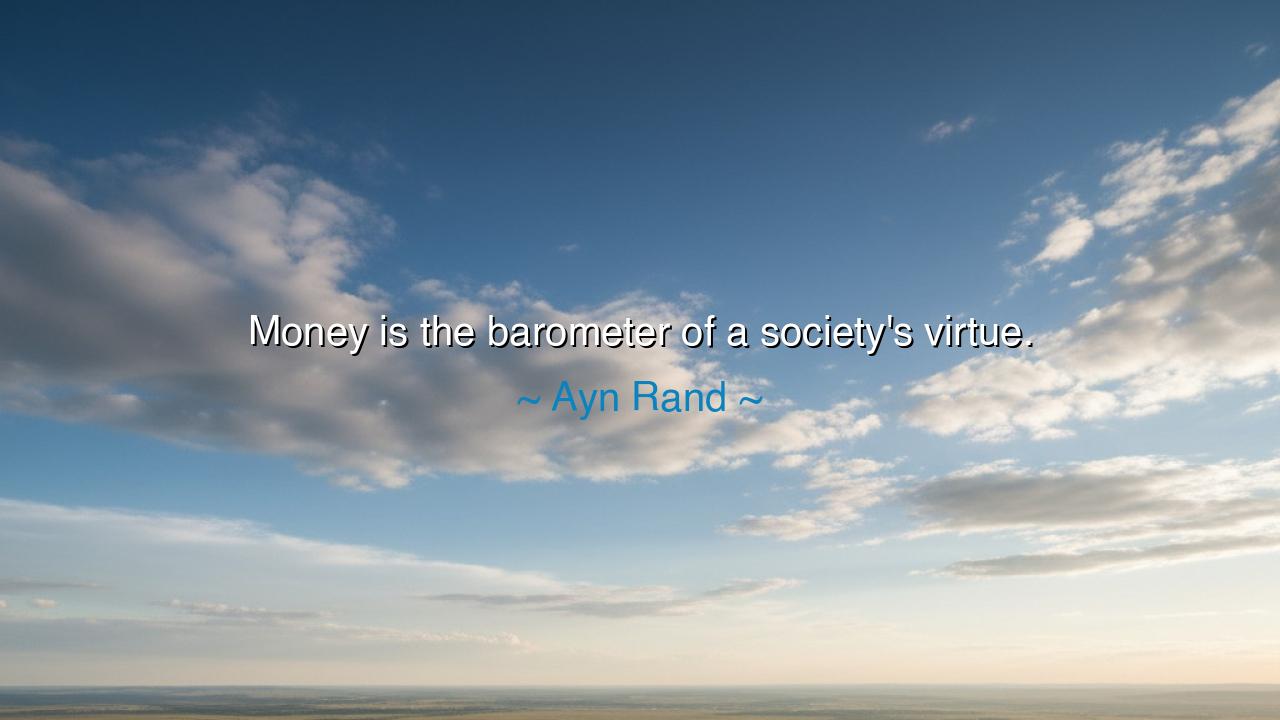
Money is the barometer of a society's virtue.






The philosopher of individualism, Ayn Rand, once declared with unflinching certainty: “Money is the barometer of a society’s virtue.” These words, like a blade, cut through illusions to reveal a harsh truth: the way a people earn, honor, and use money reveals the true state of their moral character. For money is not evil in itself; it is a tool, a mirror reflecting whether a society is built on honesty, productivity, and justice—or on corruption, greed, and deceit.
To call money a barometer is to call it a measure, a gauge of the unseen atmosphere of virtue. In a society where men create, where trade is fair, and where effort is rewarded, money flows as the blood of progress. It honors invention, hard work, and service to others. But in a society where power, theft, and exploitation dominate, money becomes tainted, not a symbol of virtue but of vice. Thus, Rand’s words remind us that to judge a nation, we need not look at its temples or speeches—look instead at how money changes hands.
History speaks loudly of this truth. In the days of Florence during the Renaissance, money flowed into the hands of merchants, artisans, and thinkers who created beauty, knowledge, and innovation. Gold was exchanged not for destruction but for creation: Michelangelo carved marble into glory, Brunelleschi raised cathedrals, and scholars preserved and expanded wisdom. Here, money measured the virtue of a society that honored genius and labor, and the city flourished as a beacon of civilization.
But contrast this with the decline of Weimar Germany in the 1920s, when corruption, despair, and injustice poisoned the land. Money lost its meaning, inflated until it was worth less than paper, and citizens carried baskets of worthless bills to buy bread. Here the barometer revealed a storm of moral collapse: a society where dishonesty, broken promises, and political decay had hollowed out trust. The collapse of money was not merely economic; it was the reflection of a deeper collapse of virtue.
Rand’s words also cut into the personal heart: how do you treat money? Do you see it as the fruit of honest effort, a symbol of exchange freely chosen, or do you treat it as an idol to hoard, or worse, as a thing to seize unjustly? For just as money reveals the spirit of a nation, so too it reveals the spirit of each man. To value money rightly is to value labor, to respect others’ efforts, to understand that every coin represents hours of life given, creativity spent, strength invested.
The lesson for us is stark: do not despise money, nor worship it blindly. Instead, honor it as the measure of virtue—seek to earn it honestly, to spend it wisely, to use it in ways that uplift rather than destroy. For if society treats money as spoils for the corrupt, then virtue is dead; but if society treats money as the just reward of effort, then virtue is alive. To heal a nation, heal first its view of money, and the roots of justice will grow again.
Practical wisdom flows: work not for plunder but for creation. Honor the labor of others by paying fairly, by trading honestly, by rejecting the counterfeit paths of theft or deceit. Build wealth not as a master, but as a servant that empowers freedom, growth, and dignity. And when you see corruption in money’s use, know it as a signal—a barometer—that the deeper air of society is poisoned and needs cleansing.
So let Ayn Rand’s words resound as both a warning and a challenge: “Money is the barometer of a society’s virtue.” Watch how money moves, and you will see the soul of a people. Guard your own dealings, and you will guard your honor. For in the end, it is not the coin that holds virtue, but the hearts of those who give, earn, and spend it. And as goes the virtue of its money, so goes the destiny of its society.






AAdministratorAdministrator
Welcome, honored guests. Please leave a comment, we will respond soon